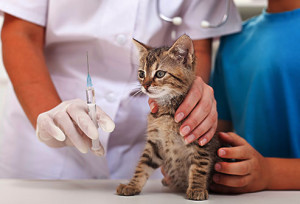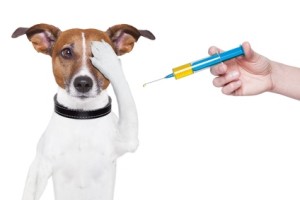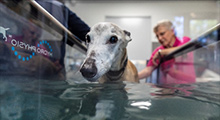Importance of Vaccinations and Annual Health Checks
11 October 2015
The best protection and prevention against infectious diseases in your pet is their annual vaccinations.


It’s easy to forget that sadly our pets cannot talk, they can’t tell us what they are feeling, or if something is troubling them. For this reason alone it is so important that your furry loved ones have their annual or biannual checkups (for seniors) and keep up to date with their vaccinations. At Pet Universe we perform vaccinations on dogs, cats, rabbits and ferrets.
At the time of vaccination an annual health check is performed which includes an 18 point physical examination. However, veterinarians can’t see what’s going on inside an animal’s body, this is why blood and urine tests are needed to complete the whole picture of the animal’s well-being. Dogs in particular are known to hide their illnesses as a survival technique so they don’t seem vulnerable.
Vaccinations are a preventative measure to protect your loved one from a range of diseases such as, Parvovirus, Distemper, Hepatitis, Parainfluenza, Bordetella and many more. Did you know that over the past year there has been a Heartworm outbreak in Australia, including 24 cases in Adelaide, this is why parasite protection is vital, click here for more information.
These preventative vaccinations could lead to substantial cost saving when compared to the financial outlay required to treat your pet for the actual disease. But most importantly vaccines will help ensure your pet lives a happy, longer and healthier life. Remember prevention is better than cure. To simplify all your pet’s annual preventative healthcare needs and to save you $200 or more annually we have put together our Complete Care Packages which are also available on a monthly payment plan. Click here for more information about our packages.
The most prominent positives from vaccinations is the prevention of disease, death and death from illness. Knowing your cat or dog is vaccinated enables you to socialize your pet worry free without having to consider catching an illness. Although it is important to note that your pet doesn’t need to come into contact with another dog or cat to catch some of the viruses. Many of the viruses live in the environment, for example Heartworm, which is transmitted via Mosquitoes. Additionally your pet will not be accepted for boarding, daycare or grooming if the animal is not up to date with its vaccinations.
How often should your dog or cat be vaccinated?
Dogs
Your dog should be vaccinated yearly, unless they are a puppy. Pet Universe’s protocol for vaccinations start at the age of 6-8 weeks. The vaccinations occur monthly, resulting in a total of 3 vaccines, with their last vaccination occurring around the 14-16 week mark.
For adult dogs they receive an annual C5 vaccination, which prevents against 5 potentially fatal viruses: Parvovirus, Distemper, Hepatitis, Parainfluenza and Bordetella bugs. Parainfluenza and Bordetella can both lead to Kennel Cough.
If a dog misses their yearly vaccines, they will need an extra booster a month later, leading to even more costs. If you keep up with your dog’s vaccination this will lead to cost savings, compared to if you had to pay for an extra shot if you missed a yearly booster.
Cats
Similar to dogs, your cat should be vaccinated yearly unless they are a kitten. Pet Universe’s protocol for vaccinations start at the age of 6-8 weeks.
The two main vaccines for felines is the FIV (Feline Immunodeficiency Virus) and the F3 vaccination.
The FIV vaccination includes 3 injections and 2 for F3 vaccinations. The FIV vaccine starts at weeks 6-8, occurring every 2 weeks. For the F3 vaccines, this begins at 8 weeks, and then one in a month to occur at the same time of the final FIV vaccination.
The cat will have an annual booster of F3 and FIV. F3 vaccination prevent against Feline Herpes Virus, Feline Calicivirus and Feline Panleukopaenia. The FIV vaccination prevents against Feline Aids.
FIV is a potentially fatal viral disease that weakens the immune system of a feline. FIV is the Feline equivalent to human AIDS, alike human AIDS there is no cure or treatment. The only way to help prevent this awful disease is with the vaccine which aids in prevention of the infection of FIV.
FIV is a common virus in stray and outdoor cats and these cats are at a higher risk of contracting this disease. It is transmitted through fighting and bite wounds, with an infected cat biting a healthy cat, the virus being spread via saliva.
Cats infected with FIV may stay healthy for a number of years, while other infected cats show no signs of the disease, this is why prevention is so important. Some infected cats may show signs of fever, loss of appetite and diarrhea. As the disease becomes more serve, symptoms such as weight loss, poor coat and sores in and around the mouth may become prevalent. Sadly the immune system eventually becomes too weak to fight off other viruses or diseases and the cat will die from one of the consequential infections.
It is crucial for your pet’s health that they are kept up to date with their vaccinations. If you have any queries regarding the protocol we use for vaccinations or any other questions, please contact Pet Universe to speak to one the members of our friendly team.
North Gate: 08 8369 3111
Broadview: 08 8266 4666
How often should your pet visit the vet?
It is important for your pet to visit the vet annually or biannually (for seniors ) for a checkup.
It is known that dogs and cats age faster than humans, therefore they must go to the vet more often than we go to the doctor. It’s a common known fact that one year of a pet’s life is equivalent to 5- 7 human years, but this is quite simplified.
Puppies mature rapidly during the first year of their life and are considered to be teenagers after their first birthday. After 24 months they are approximately 25 years old. At this point the aging process slows down to about 7 years for smaller breeds and 5 years for larger breeds.
But the most important thing to note is that dogs and cats age faster than we do and must visit the vet on average of 2 times a year, especially if they are geriatric.
To put this into perspective, if we get a physical checkup yearly, that’s the equivalent to taking your pet to the vet every 4-5 years, which is not suitable if you want your pet to live a happy and fulfilled life.
Putting your dog or cat onto a preventative health care plan is a great way to ensure your pet is always up to date with their vaccinations and other preventative health care issues. Pet Universe offers a Complete Care Package for all stages of your pet’s life, Click here for more information .


